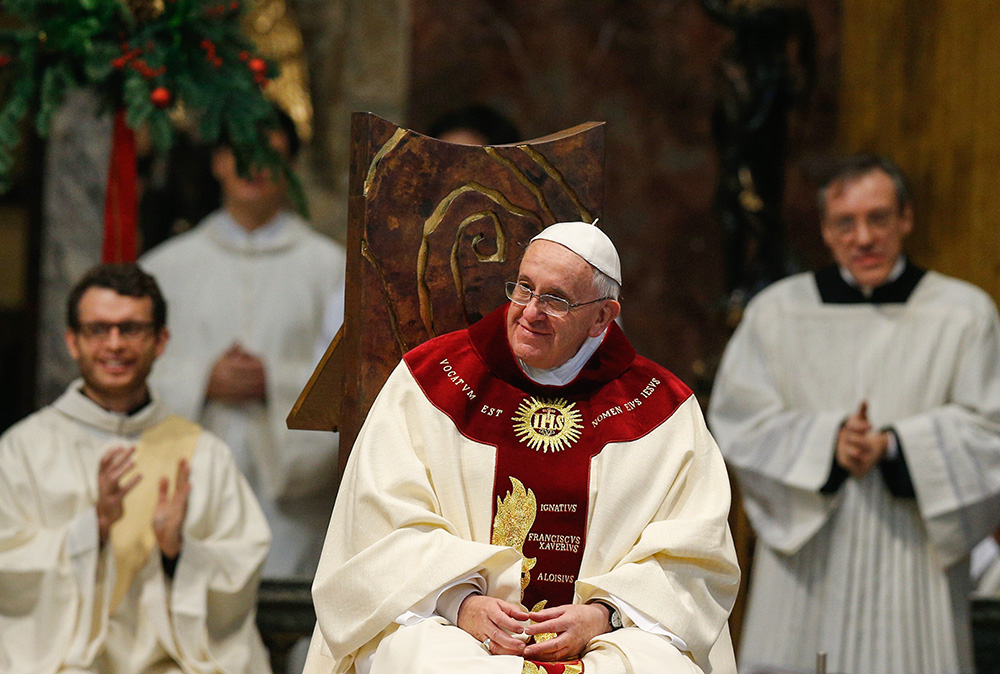
Pope Francis smiles during Mass at the Society of Jesus' Church of the Gesù in Rome Jan. 3, 2014. The pope celebrated Mass with 300 of his Jesuit confreres in thanksgiving for the canonization of Jesuit St. Peter Faber. (CNS/Paul Haring)
For Jesuit Fr. Antonio Spadaro, traveling alongside Pope Francis was never just about logistics or protocol; it was about witnessing a deeply human and profoundly spiritual way of leading the church.
A close friend and frequent companion of the pope on his international journeys, Spadaro said Francis had a consistent ritual wherever they went: an insistence on meeting with local Jesuits. He didn't want grand speeches or rehearsed reports; instead, he asked questions and welcomed them in return.
At the heart of these gatherings was the pope's disarming approach to dialogue. Spadaro recalled that Francis would often break the ice with a simple invitation: "Let's start with the ball in the center," as if to signal that what was about to unfold wasn't a lecture, but a game — a communal exploration of faith and mission.
"The pope always responded in a very direct manner," Spadaro said, adding that the mood was never rigid or formal. Rather, Francis sought intimacy, a sense of shared brotherhood.
"From the beginning, he always made it clear that he wanted it to be a community gathering, he wanted there to be a community atmosphere," Spadaro said.
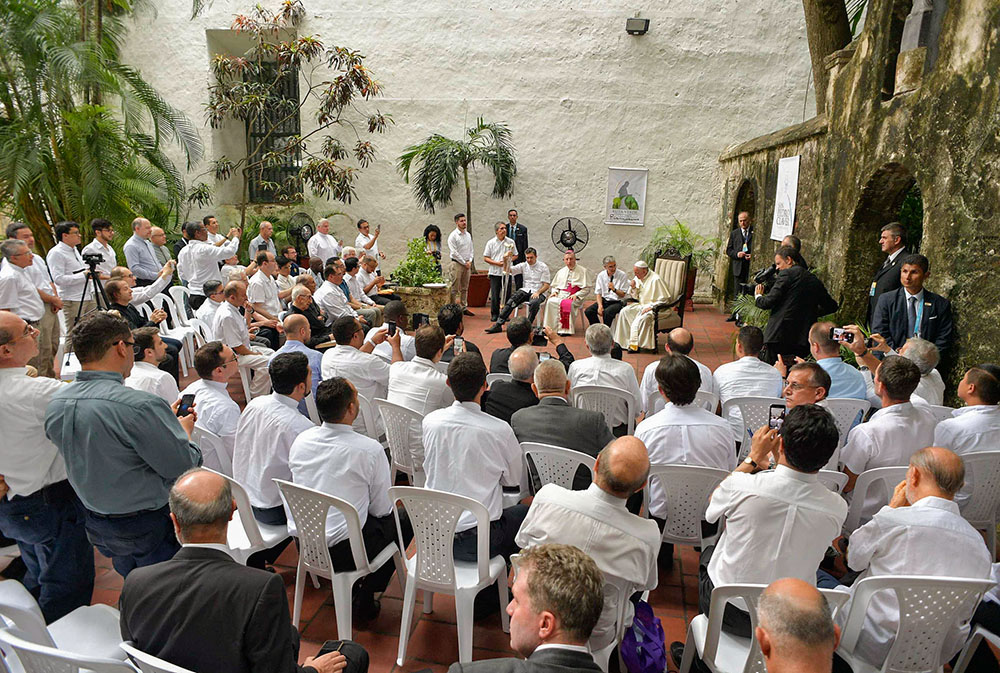
Pope Francis answers questions from his Jesuit confreres in Cartagena, Colombia, on Sept. 10, 2017. (CNS/handout, L'Osservatore Romano)
Behind this openness as the first Jesuit pope was a man shaped by trial and transformation in his own congregation, the Society of Jesus. During his difficult years with his superiors in Argentina, he was placed in a two-year exile in a Jesuit residence in Córdoba, Argentina.
Francis endured tensions that would have broken many. Yet, Spadaro said, they forged the future pope's rare inner calm.
"The difficulties he experienced tempered him greatly," Spadaro said. Francis didn't just survive the pressure, he grew from it. He learned to carry the weight of conflict without letting it crush him. "He once told me that when he returned to the chapel at Casa Santa Marta in the evening and stopped to pray about the most complicated things of the day, it was as if he were taking off a coat."
As the church now looks toward a future beyond Francis' papacy, Spadaro sees in him a legacy that will continue to challenge and inspire the Society of Jesus. "Francis has become a very strong and positive stimulus for the Society of Jesus," he said, pointing to two pillars the pope continually emphasized: discernment and presence on the frontiers.
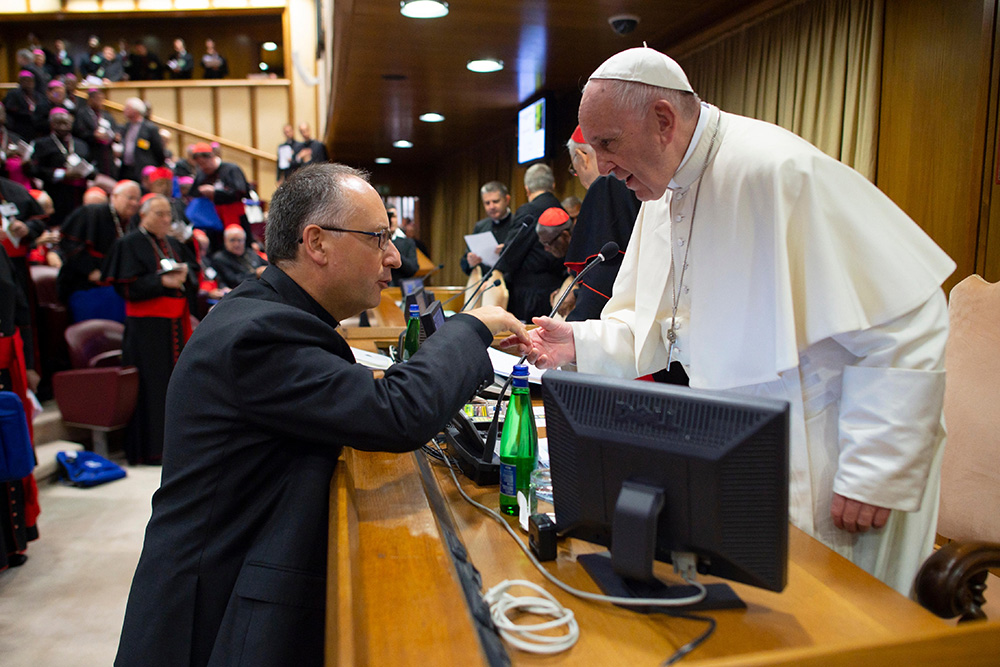
Pope Francis talks with Jesuit Fr. Antonio Spadaro during a session of the Synod of Bishops on young people, the faith and vocational discernment, at the Vatican Oct. 4, 2018. (CNS/Vatican Media)
The Jesuits, Spadaro explained, are being called once again to risk, to engage, to move out of comfort zones. "Choosing the frontiers as the place, not safe places, but also great fidelity to the church," remains at the heart of that call. And Francis, ever loyal, "always called himself a 'son of the church.' "
'Man of God'
In an emotional press conference held at the General Curia of the Society of Jesus in Rome just three days after the pope's death, Jesuit Fr. Arturo Sosa, superior general of the order, offered a poignant tribute to Francis, remembering him as a spiritual leader whose life and papacy were deeply rooted in a profound relationship with God.
Just a few feet from St. Peter's Square, the gathering was more than a commemoration; it was a reflection on the soul of a pontificate that defied convention and called the church into greater engagement with the world's suffering and complexity. "Of the many facets of a person with the long life and responsibilities that he had to carry out," Sosa said, "I would like to highlight Pope Francis' dimension of 'man of God.' "
It was a theme Sosa returned to repeatedly, emphasizing that Francis' leadership could only be fully understood through the lens of his spiritual convictions.
Sosa noted the pope's unwavering dedication to discerning God's will, often at the cost of public approval. "Pope Francis did not seek to please everyone or measure his performances by some popularity index," Sosa said.
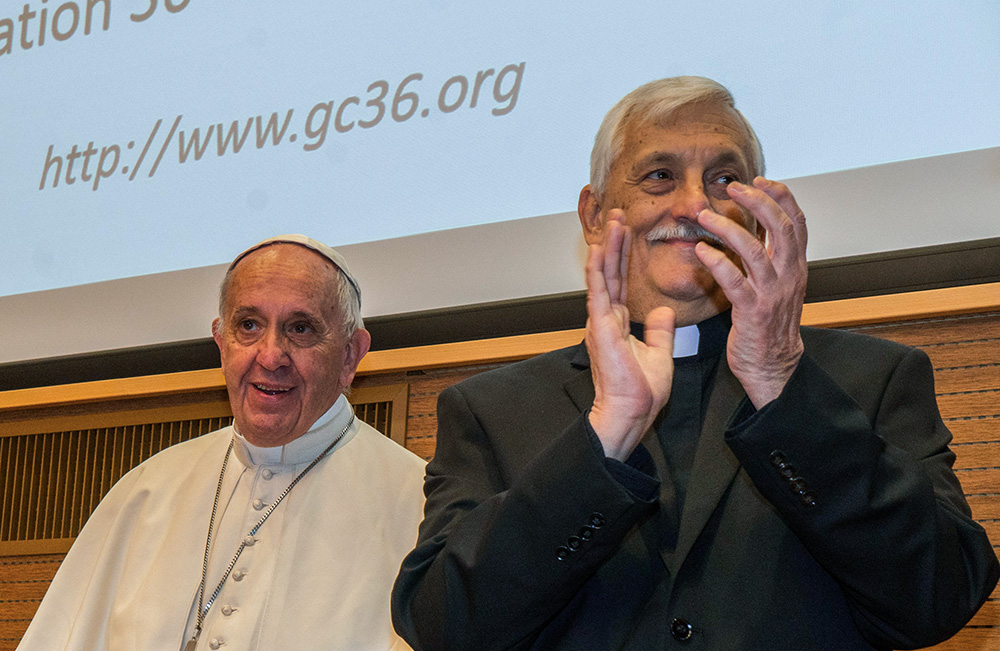
Pope Francis is seen next to Fr. Arturo Sosa, then the newly elected superior general of the Society of Jesus, at the Jesuits' 36th general congregation in Rome Oct. 24, 2016. (CNS/Don Doll, SJ)
Instead, Francis modeled a form of leadership grounded in prophetic listening, dialogue and prayerful discernment, Sosa said. Francis' choices were shaped by a desire to "scrutinize the signs of the times and in prayer, in familiarity with his Lord, to discern what is most appropriate at any given moment."
The Jesuit superior general invited the public to reflect not just on the man, but on the enduring message he leaves behind: a call for a more fraternal and just world. "Let us talk about Pope Francis and the message that we receive through him as human beings, as Christians, as people committed to putting into practice the dream of a dignified life for all," Sosa urged.
He described Francis as "a man who knew how to acquire God's merciful gaze on human complexity and gave his life to open up greater spaces for common life."
On the future of the church post-Francis, Sosa reminded the audience that the conclave is called to find "Peter's successor, not Francis' successor."
Sosa also reaffirmed the Society of Jesus' historic commitment to papal service, regardless of who is chosen next. "As soon as the new pope is elected, we will make ourselves available to him, as we have done for more than 450 years," he said, underscoring the so-called "fourth vow" of obedience that lies at the heart of the Jesuit identity.
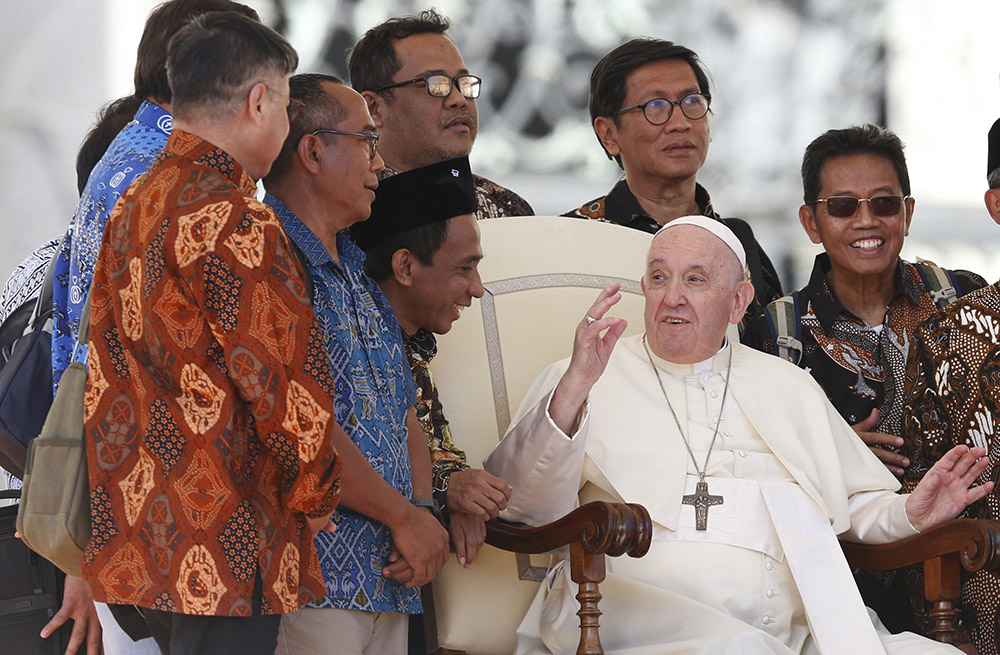
Pope Francis meets Jesuit priests from Indonesia during his general audience in St. Peter's Square at the Vatican Sept. 21, 2022. (CNS/Paul Haring)
"We are looking for another man of God," Sosa said, when asked about his views on Francis' successor. "Very important to me is to have someone who has a universal outlook, which is different from an international outlook. International are the big production firms like McDonald's. Universal means that the starting point is respect for cultural differences."
For Sosa, these differences are not obstacles but opportunities: "Differences are not barriers but possibilities for encounter and richness, to do the mission of the church, which is to bring the merciful face of the Lord to all."
Radical freedom
The portrait of Pope Francis that emerges from the Jesuits who knew him best is not simply that of a reformer, but of a Jesuit through and through — one whose spirituality shaped the soul of his pontificate. According to Jesuit Fr. James Martin, the most enduring gift that Francis leaves to the Society of Jesus is not a policy or a structure, but a way of being.
"A renewed emphasis on the value of discernment in the life of the church and in the life of the society, and also his own personal witness as a Jesuit living simply, being close to the poor and being free," Martin said while standing in line at St. Peter's Square to pray before the pope's body lying in state in the basilica. "He didn't have to wear the red shoes, he didn't have to live in the Apostolic Palace. It didn't bother him that people critiqued him on and on."
Advertisement
That radical freedom — what Jesuits call "indifference" in the Ignatian tradition — set Francis apart in the modern church. As the first pope in centuries to come from a religious order, and therefore having taken a vow of poverty, his presence was inherently disruptive in the best of ways.
"He wasn't a climber in any way," Martin said. "It's very Jesuit." That refusal to chase power or privilege allowed Francis to lead with authenticity, compassion and a bold proximity to the margins.
Yet, as both Spadaro and Martin recalled, the man who became pope was not born fully formed. His decades in the Society of Jesus — especially during the painful years in Córdoba — were a crucible that softened and deepened him. Martin noted how even Francis' early rigidity in Argentina gave way to warmth and openness.
"He was seen as, by his own admission, rigid and authoritarian, and by the time he became pope, no one thought of him like that," he said. "The warmth was new, the spontaneity. That was part of the grace of office."
That grace, Martin witnessed firsthand, wasn't only reserved for grand gestures or symbolic moments — it extended to difficult conversations. Recalling a private exchange after Francis had used language that many LGBTQ Catholics found hurtful, Martin shared a personal turning point.
"He pulled me back and said, 'Thank you for that conversation. I needed it.' I couldn't believe it. I mean, who thanks someone for a challenging conversation?" That moment of humility left a deep impression. "It really did change how I looked at criticism and growth and listening and learning."
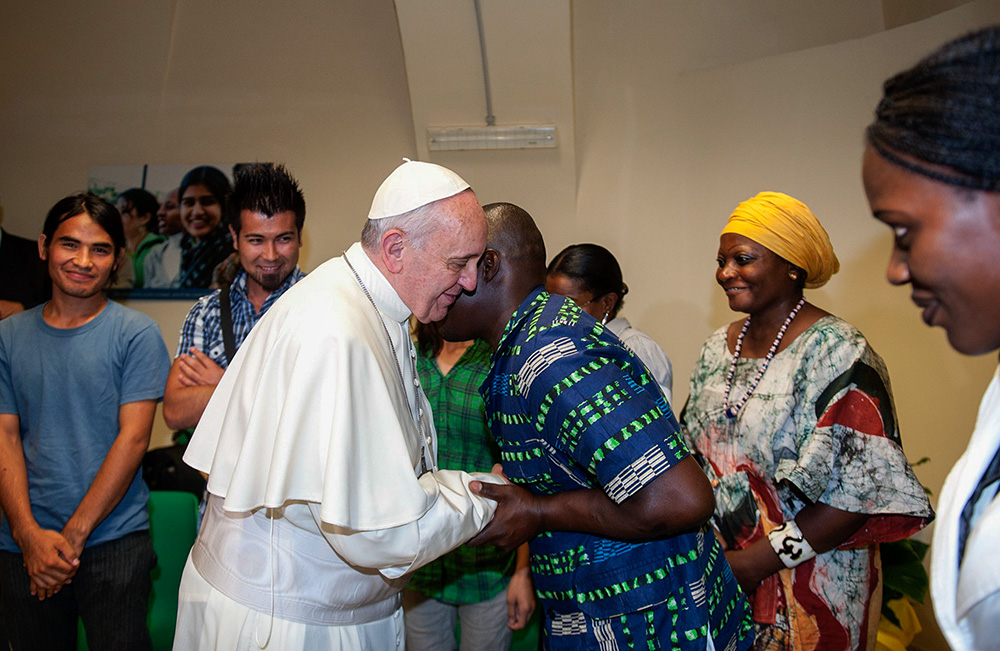
Pope Francis greets refugees during a visit to the Astalli Center of the Jesuit Refugee Service in Rome Sept. 10, 2013. (CNS/Catholic Press Photo/Alessia Giuliani)
Magnifying the Jesuit mission
For Italian Jesuit Fr. Massimo Nevola, Francis' rise to the papacy was not a break from the Society of Jesus' past, but its bold confirmation. "Francis' impact on the Society of Jesus was a great confirmation of the guidelines we had already received from Fr. Pedro Arrupe," Nevola explained, recalling the 32nd General Congregation in 1974-75, when Arrupe was the order's superior general. A historic commitment to the poor was made at that meeting — a commitment that would define the Jesuit mission for decades.
Jorge Mario Bergoglio, then Jesuit provincial of Argentina, had been present at that pivotal moment, and Nevola believes that as pope, "he amplified [those insights] and offered them to the world church." In Francis, the Jesuits saw not a novelty, but a magnification of their deepest convictions.
Nevola also pointed to Francis' spiritual transformation during his time in Córdoba as key to understanding his papal identity. "Francis converted like Paul on the road to Damascus," he said. The radicalism that once expressed itself in divisive leadership was redirected into a Gospel-centered life of simplicity and compassion. His papal name was not just symbolic, but a programmatic statement, Nevola said.
When Nevola met the newly elected pope with Jesuit schools from across Italy for the first time in 2013, he didn't find a distant pontiff but a brother, he said. "It was like meeting a normal Jesuit superior, someone who welcomes you and makes you feel not only loved, but also empowered."
That, to Nevola, was the true Francis — transfigured, yet unmistakably Jesuit.







